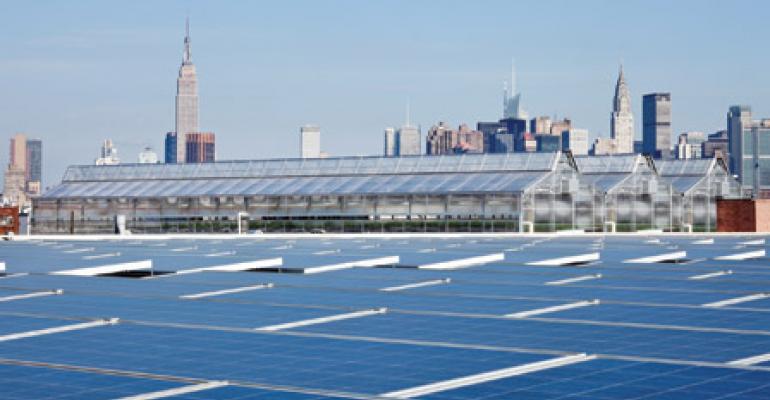NEW YORK — Atop a large warehouse located in an industrial section of Brooklyn lives a lush hydroponic greenhouse — one of the first of its kind — that may reshape the direction of urban farming.

The 15,000-square-foot facility is operated by Gotham Greens, a 25-employee startup that began growing a range of lettuces and herbs in May and supplying them in June to supermarkets and restaurants around New York City — an “ultra-local” source of produce. Initial customers include D'Agostino's, Whole Foods Market, Union Market and online grocer FreshDirect, whose distribution center is just blocks away.
While soil-based urban farming is not new, Gotham Greens is one of the leaders of a different breed of urban farming that relies on hydroponics — constantly circulating, nutrient-rich water — to grow vegetables in a pristine, climate-controlled environment 365 days per year. “Our plants are very coddled,” said Viraj Puri, co-founder and chief executive officer of Gotham Greens.
And with their proximity to the marketplace, these operations promise same- or next-day delivery of high-quality product at competitive prices, catering to the growing enthusiasm for local products. “What retailers and chefs find compelling is that they are getting really fresh produce every day,” said Puri. “Very often we can harvest in the morning and have food on the retail shelf by lunch time. The shelf life gets passed on to the customer.”
Other examples of localized hydroponic farming include BrightFarms here (see: "A Different Approach"), which plans to build greenhouses on the rooftops of two supermarkets next year, and PodPonics, Atlanta, which has started supplying local restaurants with an assortment of lettuces from a network of recycled shipping containers near the Hartsfield-Jackson Atlanta International Airport.

Gotham Greens also touts a variety of environmental benefits. For example, the hydroponic methods use 20 times less land and 10 times less water than conventional agriculture, while eliminating fertilizer runoff and pesticides. Pests such as aphids are controlled by introducing their adversaries, such as ladybugs. Alongside the greenhouse are solar panels that deliver 55 kilowatts of energy. “Part of our mission us to be as sustainable and environmentally friendly as possible,” Puri said. The operation also minimizes exposure to such foodborne pathogens as E. coli and Salmonella and offers one-step traceability to the source.
Gotham Greens grows about nine varieties of lettuce (such as butterhead, oak leaf, green leaf, red leaf, bok choy and lollo rossa) and four types of herbs (notably basil), sold in clear plastic clamshell containers to retailers. “We selected what would grow well in our system as well as crops there is a market for,” said Puri, adding that salad greens, which are extremely perishable, benefit from being grown locally rather than shipped long distances. The 4.5-ounce lettuce and 1.5-ounce basil packages retail for $3.99.
Financing for Gotham Greens came from the three founders, private investors and loans from such entities as the Small Business Administration, the New York Business Development Corp. and New York State Energy Research and Development Authority. (Puri declined to cite the startup cost.) Next year Gotham Greens plans to open a second Brooklyn greenhouse where other crops, such as tomatoes, will be grown. “The demand is outstripping the supply, which is why we're growing,” said Puri. The greenhouse currently ships between two and three tons of produce weekly.
TASTE TEST
Some critics of hydroponic growing say that crops sacrifice flavor by not being grown in a soil environment. But Puri argues that it's more complex than that, depending on how crops are cared for, climate conditions and other factors. “Broadly speaking, one can't say hydroponics is better or worse — it's just another form of agriculture,” he said.
Eric Stone, purchasing assistant buyer for FreshDirect in Queens, which delivers online orders in the New York Metro area, praises the “taste, freshness and appearance” of Gotham Greens' products. “We believe in Gotham Greens and the fact that they can offer us consistently high quality,” he said. “You wouldn't expect it to come out of a small greenhouse in Brooklyn.”
“The taste is surprisingly very good and the texture is good,” said John Vasapoli, director of produce for D'Agostino's, with 14 largely Manhattan-based stores. “I find we're getting longer shelf life and the product is holding up better and is fresher.”
Both Stone and Vasapoli appreciate the year-round proximity of the greenhouse to their retail operations. “We strive to be a local company with our produce selection and we love the idea of Gotham Greens being down the street,” said Stone. “I place an order and get the product the next day, picked to order,” noted Vasapoli. “Where else can you get that?” Gotham Greens is also able to deliver smaller, more manageable quantities to D'Agostino's stores than a grower coming from a greater distance, he added.
D'Agostino's purchases all of Gotham Greens' leaf lettuces as well as basil. Since June, sales have doubled, with basil the best-seller, followed by butterhead lettuce, said Vasapoli.
FreshDirect's sales of Gotham Greens have been strong, said Stone, though he did not provide numbers. The online grocer has been promoting the $3.99 clamshell packs of lettuce at two for $7; red leaf will be promoted at $3.49 each and two for $6. The best seller has been the mixed salad greens.

